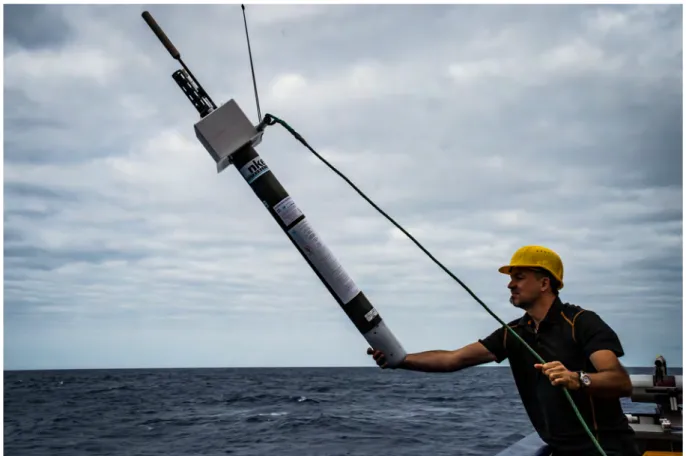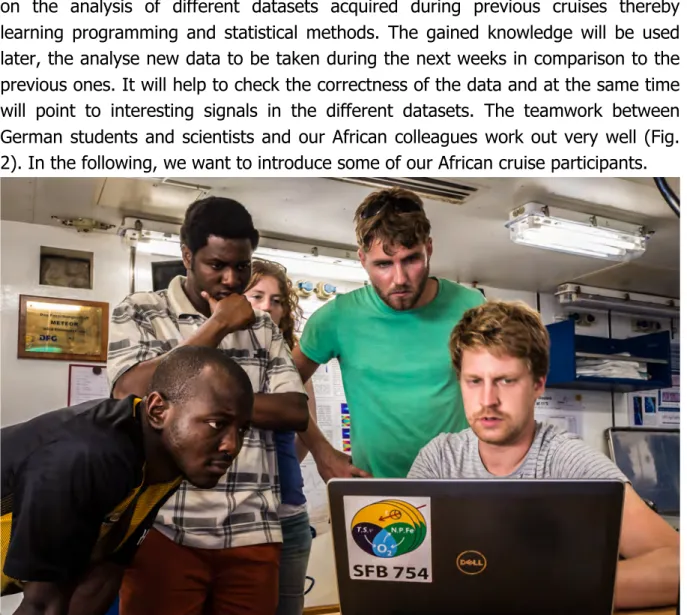Prof. Dr. Peter Brandt Meteor cruise 131
2
ndWeekly Report M131, Recife-Walvis Bay
07.10.-12.11.2016
The transit from Brazil to Angola along 11°S dominates also the second week of METEOR cruise M131 from Recife to Walvis Bay. All cruise participants have been successfully adjusted to the every day work. It consists of hourly measurements with the underway CTD system carried out 24 hour a day in changing watches, occasional CTD stations and the deployment of Argo floats (Fig. 1). Measurements along 11°S are repeatedly performed during different METEOR cruises in the last years (M98, M120). They are part of the BMBF cooperative project RACE and are aimed to investigate water mass changes in the upper ocean of the tropical South Atlantic.
The underway CTD system includes a freefall profiler measuring temperature and salinity as the ship is moving away from the deployment location. After reaching a depth of about 400m the probe is recovered using the winch installed at the ship’s stern. The probe is re-launched time after time without needing to stop or slow down. The underway CTD system worked very well so far and the measurements show the decline of the upper warm water layer from west to east while approaching the upwelling areas off Southwest Africa. This is connected to a sensible reduction in air temperature.
Abb. 1: Auslegen eines Argo Tiefendrifters (Foto: SvN).
Prof. Dr. Peter Brandt Meteor cruise 131
Due to the transit, we have the time to present and discuss the scientific work of our cruise participants during daily seminars. It also allows investigating science topics that are not central to own research. We have established different groups focussing on the analysis of different datasets acquired during previous cruises thereby learning programming and statistical methods. The gained knowledge will be used later, the analyse new data to be taken during the next weeks in comparison to the previous ones. It will help to check the correctness of the data and at the same time will point to interesting signals in the different datasets. The teamwork between German students and scientists and our African colleagues work out very well (Fig.
2). In the following, we want to introduce some of our African cruise participants.
Abb. 2: Common analysis of the acquired data. From left: Blessing Kamwi, Rodrigue Anicet Imbol Koungue, Megan Metcalfe, Robert Kopte, Soeren Thomsen (Photo: SvN).
Learning together, to understand the ocean better
The tropic Atlantic Ocean I only know from data, which were collected by oceanographers during previous cruises and which I used for my master degree. My subject now is the study of the circulation of the southeast Atlantic Ocean with the focus on Benguela Nino and Nina.
This is my first time at sea. Never before I have been on a research vessel and I am really grateful for being aboard „Meteor“. During this cruise I can learn, how to deal with the different scientific devices (ADCP, glider, CTD, floats etc.), which measure relevant parameters like temperature, salinity, Chlorophyll, depth, velocity.
Prof. Dr. Peter Brandt Meteor cruise 131
Physical processes relevant for the oceanic variability in the southwest African upwelling region and their impacts for example on fisheries is nearly unknown in my home country Cameroon, though fishery is the main income source, but the view of oceanographers is missing.
Collaboration and life on board „Meteor“ are really great. I work together with four German and one Namibian colleague in a watch. Furthermore there are working groups, where we learn to process data. I think, it is important to learn from each other without boundaries in our heads, because the ocean has no boundaries.
At home in Cameroon there was no possibility to study oceanography. Therefore I studied physics and geophysics. Then I went to Benin to study oceanography. Now I am working on my PhD thesis at the University of Cape Town, South Africa under the supervision of Assoc. Prof Mathieu ROUAULT within the EU project PREFACE and hope, that I am able to go back to Cameroon as an oceanographer next year.
Rodrigue Anicet IMBOL KOUNGUE, 27 years old
Besides the preparation of the reception in Luanda, which we do in close cooperation with our partner institute INIP (Instituto Nacional de Investigação Pesqueira Republica de Angola), we have also the possibility to test different instrumentation to be used during the next week in the coastal upwelling region off Southwest Africa.
Among them are instruments to be deployed in moorings and bottom shields, gliders and the ScanFish. Unfortunately, there are quite strong winds and currents against us, which reduces our transit speed somewhat compared to M120 almost exactly one year ago. Anyway, we are looking forward to the upcoming work off Angola and looking forward to arrive in time in Luanda.
Greetings from the tropics,
Peter Brandt and the cruise participants of M131

